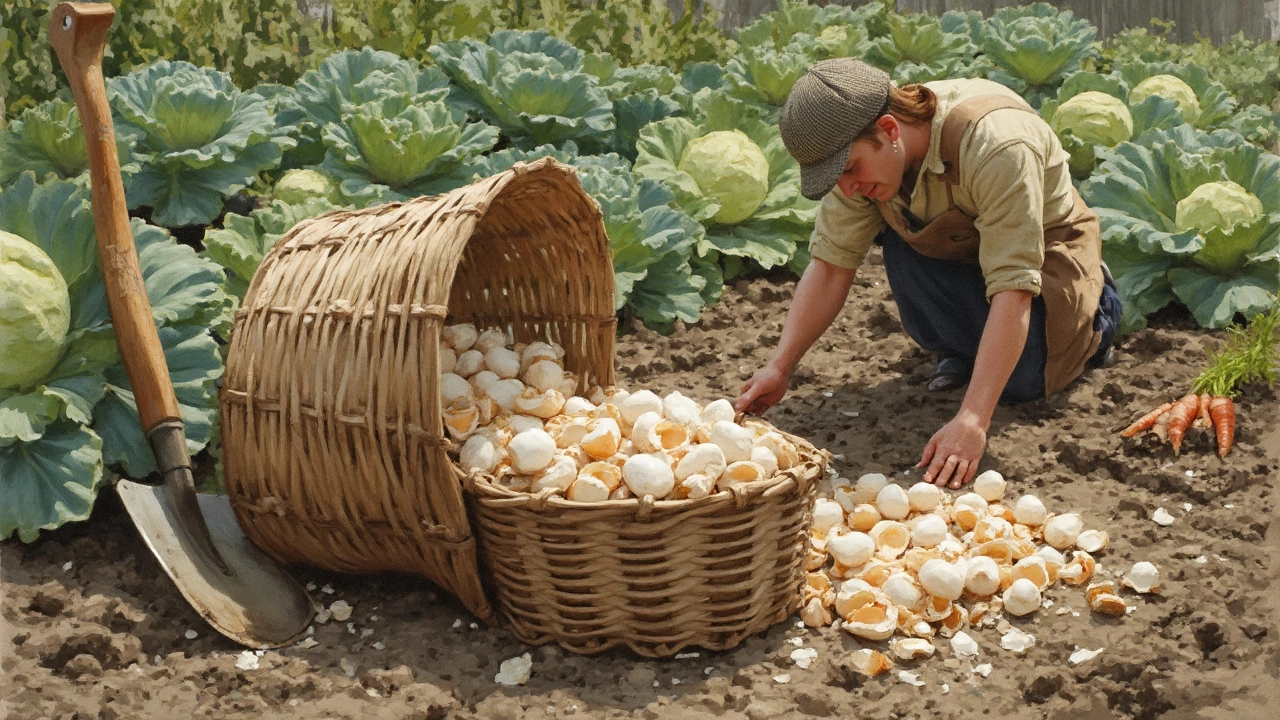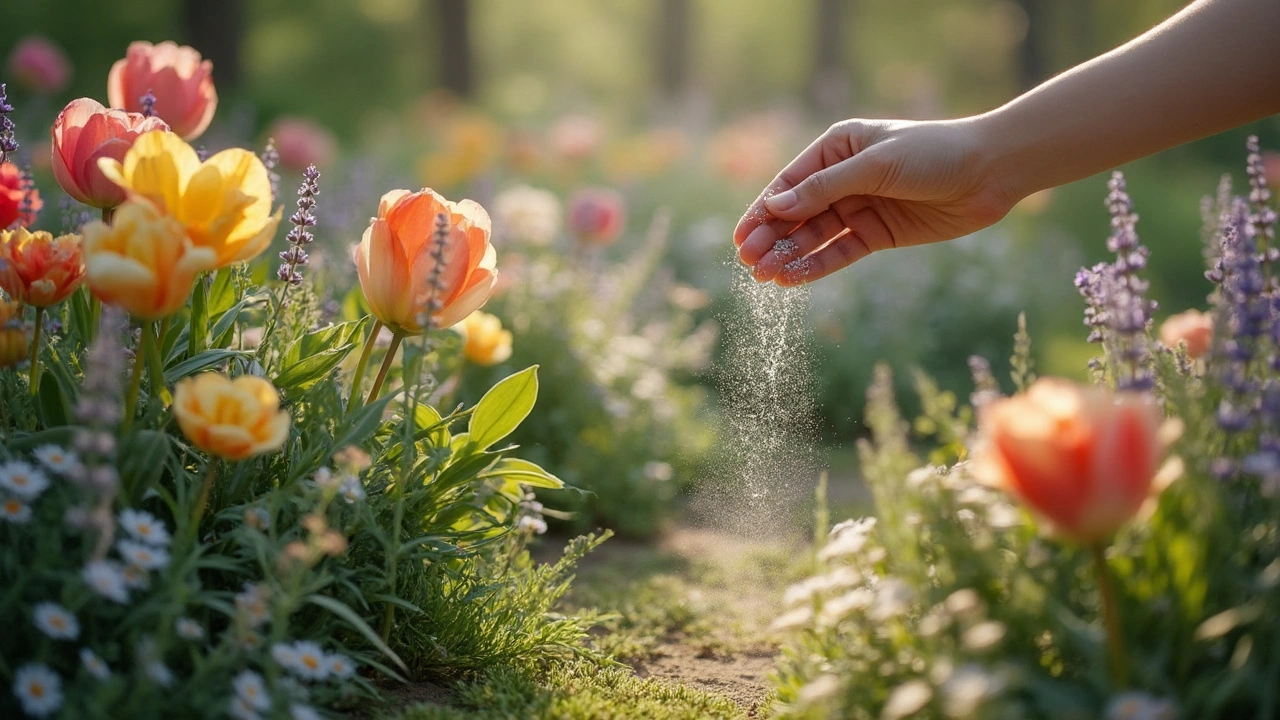Ready to give your plants a calcium boost without spending a dime? Let's talk about eggshells. These crunchy breakfast leftovers might just be your garden's new best friend. When it comes to organic gardening, crushed eggshells are a goldmine of nutrients, with calcium at the top of the list. Plants love it, especially tomatoes, peppers, and eggplants, which can really struggle without enough calcium.
But don't just grab those shells and toss them into the soil. There’s a little bit more to it, which makes a big difference. First, you'll need to gather your eggshells, rinse them thoroughly to get rid of any egg residue – trust me, you don't want the smell – and then let them dry.
Sounds simple enough, right? But, hold your horses! There are some practical steps that can help maximize their effectiveness. Crushing them into fine bits is key; not only does it help them break down faster, but it makes it easier for your plants to absorb the nutrients. Plus, it keeps the garden tidy and less attractive to critters drawn in by larger shells.
- Why Eggshells?
- Preparation Methods
- Practical Uses in Gardening
- Benefits of Using Eggshells
- Common Myths Debunked
- Tips for Best Results
Why Eggshells?
You might wonder why crushed eggshells have gained fame among gardeners. Let's crack into that topic. Eggshells are primarily composed of calcium carbonate, which is exactly what your plants need for strong, healthy growth.
Calcium plays a crucial role in cell wall construction, which helps prevent problems like blossom-end rot in fruits and vegetables. So, if you're growing tomatoes, peppers, or eggplants, having enough calcium can be a game-changer.
More Than Just Calcium
But wait, there's more! Eggshells also contain small amounts of other beneficial elements like phosphorus and magnesium, adding even more value to their composting potential. And they're not just good for what they add. They can also improve soil drainage and aeration, which are key for root health.
Eco-Friendly and Cost-Efficient
Using eggshells is an environmentally friendly, cost-effective method for enhancing your garden. You're reducing waste by repurposing something you’d otherwise toss in the bin. Plus, they're free! If you have access to plenty of eggs, you've got a sustainable gardening resource right at your fingertips.
Natural Pest Deterrent
Another benefit? Crushed eggshells can deter pests. The jagged edges are uncomfortable for soft-bodied insects like slugs and snails, keeping them away from your precious plants without harmful chemicals.
Overall, incorporating eggshells into your gardening routine not only saves money but also helps create a healthier, more resilient garden naturally. It's a simple, clever solution for both novice and avid gardeners aiming to go organic.
Preparation Methods
So, you've decided to jump on the crushed eggshell bandwagon. Great choice! Before you get too egg-cited, let's chat about how to get those shells ready for their new life in your garden. Doing it right can make all the difference for your plants.
Collecting and Cleaning
The first step is to gather shells from your morning omelettes or baking sessions. Make sure to give them a good rinse to remove any bits of egg that might attract pests or start to rot. A quick rinse is often enough, but for those with an extra keen eye for cleanliness, a mild detergent can help.
Drying
Once they're clean, it's time to let them dry. You can just let them sit in a bowl or spread them out on a baking sheet to air dry. If you're impatient like me, stick them in the oven for a few minutes at a low temp – around 200°F (about 93°C) – just to speed things up.
Crushing
Now, this is where the magic happens. You’ve got options here: a mortar and pestle, a rolling pin, or even just your hands. Whatever you use, make sure to crush those shells into a fine powder. This helps the calcium break down faster and makes it more accessible to your plants. Pro tip: the finer, the better!
Storing
Got a stockpile and not ready to use them immediately? No worries! Keep your crushed eggshells in an airtight container to keep them dry and ready to sprinkle when needed. Go the extra mile by adding some silica gel packs to keep moisture out.
Remember, when it comes to gardening, a little preparation goes a long way. These simple steps ensure that your DIY organic gardening fertilizer is effective and ready to power up your plants.
Practical Uses in Gardening
So, you've got some crushed eggshells, and now you're wondering how exactly they fit into your garden. Let's break it down with a friendly gardening chat. From preventing pest invasions to enriching your soil, there are countless ways eggshells come in handy.
Soil Amendment
Crumbling those shells into your soil adds much-needed calcium, which prevents 'blossom end rot' particularly common in crops like tomatoes, peppers, and eggplants. Calcium also helps to maintain a balanced soil pH level.
Pest Control
One of the surprising perks of crushed eggshells is their ability to fend off garden pests like slugs and snails. How? The sharp edges provide a natural and eco-friendly barrier.
Composting
Adding eggshells to your compost pile is a great way to enhance its nutrient profile. Just make sure they're crushed finely to speed up the decomposition process. Over time, they break down and improve the quality of your compost.
Planter Drainage
Ever noticed your potting soil getting compacted? Eggshells can help. Simply layer some crushed shells at the bottom of your pots to improve drainage and boost airflow to the roots.
As gardening enthusiast Jane Cisco puts it, "Adding eggshells to the soil is like giving your plants a nutrient jackpot. It's the little things like this that make a big difference in long-term plant health."
To wrap it up, integrating eggshells into your gardening routine is as simple as it is rewarding. Whether it's in your soil or compost bin, you're adding value, bit by bit. So next time you crack an egg, remember there's more to that shell than meets the eye.

Benefits of Using Eggshells
Crushed eggshells might just be the humble hero of organic gardening. They're chock-full of calcium carbonate, one of the main components of lime, which helps to reduce soil acidity. Got soil that's a bit too acidic? Eggshells can lend a hand!
One of the most obvious benefits is how they can improve soil structure. As the eggshells decompose, they aerate the soil, making it less compact and more oxygen-rich – that's awesome for your plants' roots to spread and breathe.
Boosting Calcium Levels
Eggshells are like calcium supplements for your plants. Calcium deficiency is a common issue for tomatoes, peppers, and eggplants, leading to problems like blossom end rot. By regularly adding crushed eggshells to the soil, you're giving your crops a steady source of this crucial nutrient.
Improving Drainage
Got heavy clay soil causing drainage issues? Eggshells can help break up the soil, enhancing drainage and preventing waterlogging, which reduces the risk of root rot.
Pest Deterrent
Here's a fun fact: sharp eggshell edges can deter smaller pests. Sprinkle them around the base of plants as a rough barrier against slugs and snails. It's like a mini fortress for your plants!
Take a look at how the use of eggshells compares to other natural soil amendments:
| Amendment | Calcium Content | Effectiveness for Soil pH |
|---|---|---|
| Eggshells | High | Moderate |
| Compost | Moderate | Low |
| Bone Meal | Very High | High |
In a nutshell, using eggshells isn't just a zero-waste trick, but a practical step toward better garden health. So next time you're making breakfast, think twice about just tossing those shells away!
Common Myths Debunked
When it comes to using crushed eggshells in your garden, there's a fair share of myths floating around. Let's set the record straight about a few common misconceptions.
Myth 1: Eggshells Instantly Improve Soil pH
Some folks believe that adding eggshells will instantly boost the soil's pH. While they do have a neutralizing effect, the change isn't immediate. Eggshells take a while to break down and release calcium. So if you're looking for quick pH adjustments, you'll be better off with lime.
Myth 2: Eggshells Deter Pests Like Magic
You've probably heard that crushed eggshells can keep pests like slugs and snails at bay. In theory, the sharp edges are supposed to deter these critters. Reality check: Most pests aren't phased by them. If you're battling a slug invasion, try beer traps or copper barriers instead.
Myth 3: Eggshells Compost Easily
Another common belief is that eggshells compost quickly. Nope! They need to be crushed super fine to speed up decomposition. Even then, it can take a while in your compost pile. If you spot big bits of shell in there after a few months, you're not alone.
Myth 4: More is Always Better
It's tempting to load up on eggshells thinking they can't harm. But, excess calcium can lead to nutrient imbalances, affecting plant health. Moderation is key. A light dusting around the base of plants every now and then is plenty.
By understanding these myths, you can make more informed choices about how you use eggshells in your garden. They'll be a nifty tool in your gardening toolkit when used wisely.
Tips for Best Results
Getting the most out of eggshells in your garden doesn't require a green thumb, just a few handy tips. By following a simple routine, you can push the nutritional benefits to their peak.
Collecting and Preparing Eggshells
- Rinse Thoroughly: Make sure to rinse your eggshells well to remove any egg white or yolk residue. This prevents odors and attracts fewer pests.
- Dry Completely: Before you start crushing, let your eggshells dry out. You can air dry or pop them in a low oven for a few minutes.
- Crush to Fine Pieces: Use a mortar and pestle or a blender to grind them to a fine texture. This makes it easier for the nutrients to break down and become available to your plants.
Applying Eggshells for Maximum Impact
- Mix in the Soil: For young plants, mixing eggshells directly into the soil as you plant can provide a slow release of calcium.
- Top Dressing: Sprinkling the crushed shells around the base of the plant can create a barrier against pests and gradually add nutrients as they break down.
- Compost Addition: Tossing them into your compost pile will enrich it, adding a slow-release calcium boost once the compost is used in your garden.
Eggshell Tea
Yep, you read that right. Soaking crushed eggshells in water overnight makes a calcium-rich 'tea' that can be watered into the base of plants, providing an immediate hit of nutrients.
Understanding Eggshell Benefits
Remember, eggshells mainly release calcium, which means they are particularly beneficial in preventing and treating blossom end rot in plants like tomatoes and peppers. Used wisely, they can be a cornerstone of your organic gardening strategy.
